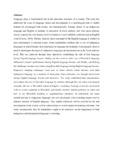| dc.description.abstract | Language plays a fundamental role in the education outcomes of a country. The study has addressed the issue of language choice and development in a multilingual state to enable learners be advantaged both locally and internationally. Despite choice of an indigenous language and English as medium of instruction in lower primary and from upper primary classes respectively, low literacy level is evident as 1 out 6 children could not read an English word (Uwezo, 2014). Further, learners’ poor command of the English language is evident in poor performance in national exams. Some stakeholders attribute this to use of indigenous languages in school despite their importance in language development. Consequently, there is need to interrogate the place of indigenous languages during instruction at the lower primary level. This was achieved through three objectives: establishing the role of first language during English language lessons; finding out the extent to which use of Kiswahili language influenced learners’ performance during English language lessons; and finally, establishing the challenges teachers face when using Kiswahili language during English language lessons. Purposive sampling techniques were used to select schools where learners used their indigenous language as a medium of instruction. Data collection was through observation during English language lessons and interviews. The study established that circumstances necessitated the use of Kiswahili language by teachers although they are often discouraged; secondly, the use of Kiswahili enhanced English vocabulary learning as learners performed well on words explained in Kiswahili; and finally, teachers lacked guidance on when and how to use Kiswahili resulting to ungrammatical sentences. In conclusion, the study established that if indigenous languages are well developed, code-switching maybe used to enhance mastery of English language. Thus, quality education will be accessed by all, and development of the society will be achieved due to overall improved learning outcomes. The study recommended that all stakeholders ought to be sensitized on the importance of both indigenous and international languages in learning. | en_US |

